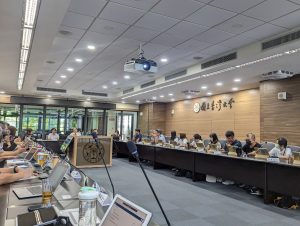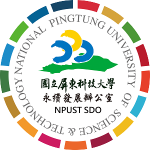On August 30th, the Taiwan University Alliance for Sustainability Governance hosted the “2023 University Sustainability Governance Workshop.” This workshop, organized by the Office of Sustainability at National Taiwan University, focused on two main themes: university sustainability governance and setting low-carbon transformation goals and strategies. Through the sharing of experiences, the event aimed to enhance communication and capacity-building among campus sustainability governance teams and promote knowledge sharing in sustainability governance across different universities.
The Taiwan University Alliance for Sustainability Governance was established in November 2022, less than a year ago. Within this short time, nine universities have established dedicated sustainability units and announced their respective low-carbon transformation goals. The emphasis of the workshop was on how to effectively implement these goals once they are announced, with the hope of gaining practical insights through the sharing of experiences from each university.
In the morning session of the workshop, a campus tour was organized at the National Taiwan University Visitor Center. The tour followed a thematic route focused on waterway restoration and environmental sustainability. Accompanied by knowledgeable guides, participants were given a comprehensive and easy-to-understand introduction, allowing members of the alliance to appreciate the rich cultural heritage and ecological achievements of National Taiwan University.
During the afternoon session of the workshop, two main topics were covered. The first topic, “University Sustainability Governance,” was presented by Director Zhang Zichao from National Taiwan Normal University’s Office of Sustainable Development and CEO Cai Menghao from National Pingtung University of Science and Technology’s Office of Sustainable Development. They shared insights on “University Influence and International Rankings” and “Sustainability Report Compilation.” This discussion emphasized introducing the Sustainability Tracking, Assessment & Rating System (STARS) for international university sustainability assessments and explained the process of creating a sustainability report for a university. This process includes conducting surveys on key sustainability issues within the university and compiling the university’s sustainability achievements.
The second topic, “Setting Low-Carbon Transformation Goals and Strategies,” was presented by Assistant CEO Xie Yihuan from National Taiwan University’s Office of Sustainability and Editor-in-Chief Wang Weizhen from National Sun Yat-sen University’s Environmental Safety Center. They shared their experiences in formulating campus low-carbon transformation goals, which encompassed tasks such as establishing promoting committees, setting carbon neutrality objectives, conducting greenhouse gas inventories, planning carbon neutrality pathways, and executing energy-saving strategies.
The workshop aimed to facilitate knowledge exchange and experience sharing among the alliance members to enhance the effectiveness of university sustainability governance. It sought to harness the collective efforts of each university to make a more significant social impact and contribute to the sustainable future of Taiwan.








